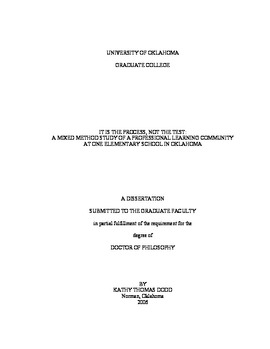| dc.contributor.advisor | Vaughn, Courtney, | en_US |
| dc.contributor.advisor | Garn, Gregg, | en_US |
| dc.contributor.author | Dodd, Kathy Thomas. | en_US |
| dc.date.accessioned | 2013-08-16T12:20:07Z | |
| dc.date.available | 2013-08-16T12:20:07Z | |
| dc.date.issued | 2006 | en_US |
| dc.identifier.uri | https://hdl.handle.net/11244/1028 | |
| dc.description.abstract | The juxtaposition of the quest for reaching accountability benchmarks and the desire for meeting students' individual needs has created a problem for district administration, site principals, and school staff. As a result, the stakeholders have struggled to redefine the way instructional and social support services are delivered to its rapidly changing students. | en_US |
| dc.description.abstract | This new "era of accountability" has called for unique investigations into ways in which schools are meeting the new requirements. A mixed method study of one Title I elementary school in Oklahoma explored how a professional learning community (PLC) was both developed and implemented in this case. In addition, the study sought to explore how learning for both staff and students was affected. Like many districts that formerly identified themselves as "suburban, " the area in which this school is located has experienced rapidly changing demographics. This change has resulted in a student population that has compared to the district as a whole, a greater incidence of poverty, higher mobility rates, and a larger percentage of non-English speaking students. These factors have perpetuated a learning gap on both state and local assessments. | en_US |
| dc.description.abstract | This study attempted to tell the story of one school's search to create the best possible teaching and learning environment while meeting the current high-stakes accountability measures for student performance. This study sought to determine if, in this case, the establishment of professional learning communities was a viable strategy for addressing accountability demands while encouraging the use of best instructional practices. The analysis focused on the school's use of teacher collaboration as a means to facilitate conversation about teaching and learning, create common assessments, conduct data analyses, and reflect on how their goals were met. | en_US |
| dc.description.abstract | In 2001, the most far-reaching educational accountability initiative was launched by the Bush administration. The No Child Left Behind Act required all students to show incremental growth toward mastery of state standards with all students demonstrating proficiency by 2014. | en_US |
| dc.description.abstract | The study indicated that increased student learning is strongly encouraged by the development of professional learning communities. In this case, the development of the PLC served as a means to focus the conversation on student achievement while encouraging collaboration among school staff as a means of addressing individual students' learning needs. The study also suggested that the development of meaningful community partnerships played an integral part in the PLC process. | en_US |
| dc.format.extent | xii, 146 leaves : | en_US |
| dc.subject | Education, Teacher Training. | en_US |
| dc.subject | School improvement programs Case studies. | en_US |
| dc.subject | Educational change Case studies. | en_US |
| dc.subject | Education, Curriculum and Instruction. | en_US |
| dc.subject | Team learning approach in education Case studies. | en_US |
| dc.subject | Education, Elementary. | en_US |
| dc.title | It is the process, not the test: A mixed method study of a professional learning community at one elementary school in Oklahoma. | en_US |
| dc.type | Thesis | en_US |
| dc.thesis.degree | Ph.D. | en_US |
| dc.thesis.degreeDiscipline | Department of Educational Leadership and Policy Studies | en_US |
| dc.note | Advisers: Gregg Garn; Courtney Vaughn. | en_US |
| dc.note | Source: Dissertation Abstracts International, Volume: 67-03, Section: A, page: 0824. | en_US |
| ou.identifier | (UMI)AAI3211366 | en_US |
| ou.group | Jeannine Rainbolt College of Education::Department of Educational Leadership and Policy Studies | |
